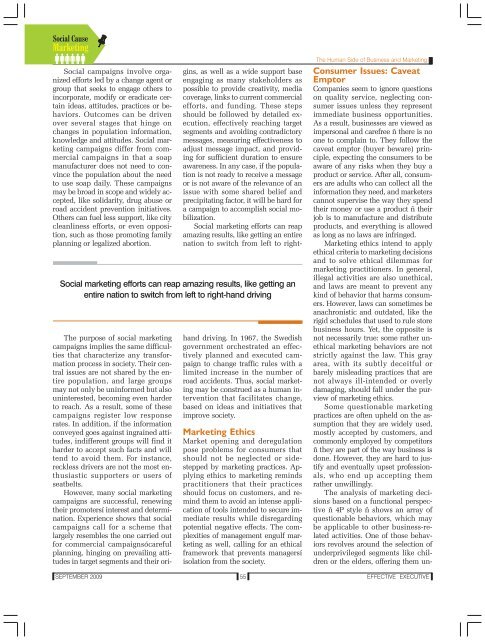Social Cause Marketing - The Regis Group Inc
Social Cause Marketing - The Regis Group Inc
Social Cause Marketing - The Regis Group Inc
You also want an ePaper? Increase the reach of your titles
YUMPU automatically turns print PDFs into web optimized ePapers that Google loves.
<strong>Social</strong> campaigns involve organized<br />
efforts led by a change agent or<br />
group that seeks to engage others to<br />
incorporate, modify or eradicate certain<br />
ideas, attitudes, practices or behaviors.<br />
Outcomes can be driven<br />
over several stages that hinge on<br />
changes in population information,<br />
knowledge and attitudes. <strong>Social</strong> marketing<br />
campaigns differ from commercial<br />
campaigns in that a soap<br />
manufacturer does not need to convince<br />
the population about the need<br />
to use soap daily. <strong>The</strong>se campaigns<br />
may be broad in scope and widely accepted,<br />
like solidarity, drug abuse or<br />
road accident prevention initiatives.<br />
Others can fuel less support, like city<br />
cleanliness efforts, or even opposition,<br />
such as those promoting family<br />
planning or legalized abortion.<br />
<strong>Social</strong> marketing efforts can reap amazing results, like getting an<br />
entire nation to switch from left to right-hand driving<br />
<strong>The</strong> purpose of social marketing<br />
campaigns implies the same difficulties<br />
that characterize any transformation<br />
process in society. <strong>The</strong>ir central<br />
issues are not shared by the entire<br />
population, and large groups<br />
may not only be uninformed but also<br />
uninterested, becoming even harder<br />
to reach. As a result, some of these<br />
campaigns register low response<br />
rates. In addition, if the information<br />
conveyed goes against ingrained attitudes,<br />
indifferent groups will find it<br />
harder to accept such facts and will<br />
tend to avoid them. For instance,<br />
reckless drivers are not the most enthusiastic<br />
supporters or users of<br />
seatbelts.<br />
However, many social marketing<br />
campaigns are successful, renewing<br />
their promotersí interest and determination.<br />
Experience shows that social<br />
campaigns call for a scheme that<br />
largely resembles the one carried out<br />
for commercial campaignsócareful<br />
planning, hinging on prevailing attitudes<br />
in target segments and their origins,<br />
as well as a wide support base<br />
engaging as many stakeholders as<br />
possible to provide creativity, media<br />
coverage, links to current commercial<br />
efforts, and funding. <strong>The</strong>se steps<br />
should be followed by detailed execution,<br />
effectively reaching target<br />
segments and avoiding contradictory<br />
messages, measuring effectiveness to<br />
adjust message impact, and providing<br />
for sufficient duration to ensure<br />
awareness. In any case, if the population<br />
is not ready to receive a message<br />
or is not aware of the relevance of an<br />
issue with some shared belief and<br />
precipitating factor, it will be hard for<br />
a campaign to accomplish social mobilization.<br />
<strong>Social</strong> marketing efforts can reap<br />
amazing results, like getting an entire<br />
nation to switch from left to righthand<br />
driving. In 1967, the Swedish<br />
government orchestrated an effectively<br />
planned and executed campaign<br />
to change traffic rules with a<br />
limited increase in the number of<br />
road accidents. Thus, social marketing<br />
may be construed as a human intervention<br />
that facilitates change,<br />
based on ideas and initiatives that<br />
improve society.<br />
<strong>Marketing</strong> Ethics<br />
Market opening and deregulation<br />
pose problems for consumers that<br />
should not be neglected or sidestepped<br />
by marketing practices. Applying<br />
ethics to marketing reminds<br />
practitioners that their practices<br />
should focus on customers, and remind<br />
them to avoid an intense application<br />
of tools intended to secure immediate<br />
results while disregarding<br />
potential negative effects. <strong>The</strong> complexities<br />
of management engulf marketing<br />
as well, calling for an ethical<br />
framework that prevents managersí<br />
isolation from the society.<br />
<strong>The</strong> Human Side of Business and <strong>Marketing</strong><br />
Consumer Issues: Caveat<br />
Emptor<br />
Companies seem to ignore questions<br />
on quality service, neglecting consumer<br />
issues unless they represent<br />
immediate business opportunities.<br />
As a result, businesses are viewed as<br />
impersonal and carefree ñ there is no<br />
one to complain to. <strong>The</strong>y follow the<br />
caveat emptor (buyer beware) principle,<br />
expecting the consumers to be<br />
aware of any risks when they buy a<br />
product or service. After all, consumers<br />
are adults who can collect all the<br />
information they need, and marketers<br />
cannot supervise the way they spend<br />
their money or use a product ñ their<br />
job is to manufacture and distribute<br />
products, and everything is allowed<br />
as long as no laws are infringed.<br />
<strong>Marketing</strong> ethics intend to apply<br />
ethical criteria to marketing decisions<br />
and to solve ethical dilemmas for<br />
marketing practitioners. In general,<br />
illegal activities are also unethical,<br />
and laws are meant to prevent any<br />
kind of behavior that harms consumers.<br />
However, laws can sometimes be<br />
anachronistic and outdated, like the<br />
rigid schedules that used to rule store<br />
business hours. Yet, the opposite is<br />
not necessarily true: some rather unethical<br />
marketing behaviors are not<br />
strictly against the law. This gray<br />
area, with its subtly deceitful or<br />
barely misleading practices that are<br />
not always ill-intended or overly<br />
damaging, should fall under the purview<br />
of marketing ethics.<br />
Some questionable marketing<br />
practices are often upheld on the assumption<br />
that they are widely used,<br />
mostly accepted by customers, and<br />
commonly employed by competitors<br />
ñ they are part of the way business is<br />
done. However, they are hard to justify<br />
and eventually upset professionals,<br />
who end up accepting them<br />
rather unwillingly.<br />
<strong>The</strong> analysis of marketing decisions<br />
based on a functional perspective<br />
ñ 4P style ñ shows an array of<br />
questionable behaviors, which may<br />
be applicable to other business-related<br />
activities. One of those behaviors<br />
revolves around the selection of<br />
underprivileged segments like children<br />
or the elders, offering them un-<br />
SEPTEMBER 2009<br />
55<br />
EFFECTIVE EXECUTIVE








